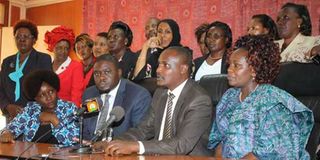MPs fail to pass Bill on gender

Cord and Jubilee MPs during a press conference on the two-third gender rule on May 5, 2016. The Bill seeking to implement the gender principal failed to get the required support of 233 MPs to pass the second reading. PHOTO | ANTHONY OMUYA | NATION MEDIA GROUP
What you need to know:
- Parliament’s expenses have been increased by its acquisition and construction of buildings.
- Last Wednesday, 195 MPs voted Aye, 28 Nay, two abstained and about 24 refused to vote.
A Bill seeking to change the Constitution and implement the gender principle failed to get the required support of 233 MPs to pass the second reading.
The vote was 178-16, with five abstaining.
MPs on Thursday afternoon voted on the crucial Bill in a bid to fulfill the gender principle, with women legislators confident that the lobbying of their male counterparts could prove to be successful.
To get the male MPs on their side, the women lawmakers split themselves into groups according to regions and held meetings with individual MPs, concentrating on those who voted Nay last Wednesday and those who refused to vote.
“We think our chances are good. A lot of the people who supported are still supporting and we have people who were not around in the first round — the nine women who were not there and then quite a number of the male members — because we needed 38 votes,” said Nyeri Woman Representative Priscilla Nyokabi.
Kenya Women Parliamentarians Association chairman Cecily Mbarire said in a statement that the vote was an opportunity for MPs to show their commitment to the Constitution.
“We appreciate all the 136 Male Members of Parliament who voted for the Bill when it was called to vote last week, and we further urge them to turn up once more for the vote tomorrow (Thursday) to ensure that this Bill passes,” Ms Mbarire said Wednesday evening.
The messages to the MPs were much more polite this time round.
RECESS
One of the biggest factors against the vote was that the National Assembly is scheduled to start a one-month break after the sitting ends Thursday and MPs traditionally do not attend the sitting before a recess.
Ms Nyokabi, one of the architects of the proposed change to the Constitution, said her group had hoped that many MPs would show up to discuss the Election Laws (Amendment) Bill, which contains the provision on academic qualifications for MPs and MCAs.
It is understood that some MPs, some of them influential, consider the Bill lost and would push for the alternative by the Justice and Legal Affairs Committee on progressive implementation of the provision.
Ms Nyokabi expressed confidence that the lobbying would work this time around. Last Wednesday, 195 MPs voted Aye, 28 Nay, two abstained and about 24 refused to vote.
“A lot of the lobbying is one-on-one and a lot of it is regional because looking at the No vote, we have been able to tell which regions have a problem,” said Ms Nyokabi.
They had noted in analysing the voting that MPs from Rift Valley and western Kenya were among those who voted against the Bill.
The women have also argued, backed by a report from the Institute of Economic Affairs, that the nomination of extra women would keep Parliament's budget at between 1-1.5 per cent of the national Budget.
Parliament’s expenses have been increased by its acquisition and construction of buildings, among which is the new building next to Continental House planned to rise to 27 storeys.
“As soon as that has been done, the running costs will be the same. They are not inordinate given the value of talent that comes with new people. That has been the essence of increasing leadership in Kenya, not just women,” said Ms Nyokabi.





